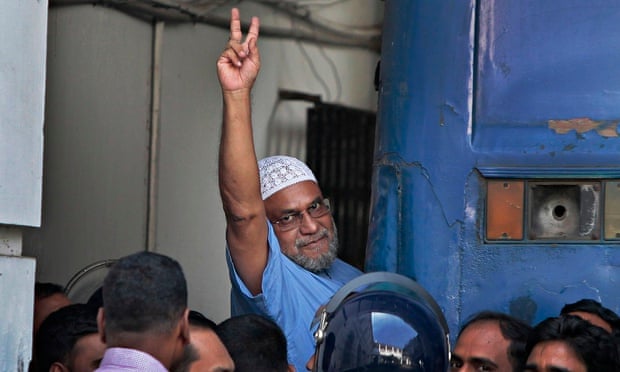By Hojin Choi
Impunity Watch Reporter, Asia
DHAKA, Bangladesh – A controversial war crimes court in Bangladesh upheld its rigorous rulings on the nation’s war crimes cases originating from the country’s 1971 breakaway from Pakistan. The court was set up as a special war crimes tribunal in 2010 by Prime Minister Sheikh Hasina’s regime. Within the last few weeks, three Islamist Party leaders were sentenced to death.
The top leader of Bangladesh’s largest Islamist Party, Motiur Rahman Nizami, was sentenced to death last month, and few days later another high official of the party Mir Quasem Ali was sentenced to death. In early November, Mohammad Kamaruzzaman, the Assistant Secretary-General of the party, was sentenced to death for conviction of genocide and torture of civilians in 1971.
The incident at issue in 1971 was a civil war that the West and East Pakistan armies fought for the autonomy and independence of East Pakistanis. East Pakistan became the independent country of Bangladesh in December 1971. During the nine months of civil war, over 10 million people fled to a neighboring country, India. According to the government, three million people died and 200,000 women were raped during the incident.
Since 2010, the court has convicted 12 people for the war crimes. Most of them were senior officials of the Islamist Party. Last year, Bangladesh people in support of the party had massive protests where tens of thousands protesters clashed with police. Reportedly, over 500 people died in the protests. The recent convictions of party leaders seem to be bringing more social unrest. After the decisions, party supporters called a nationwide strike. No violence or casualties were yet seen, but many schools and businesses closed with worry of possible dangers.

According to an Al Jazeera, “under Bangladesh jail code, the execution of an accused could be carried out within 21 days and before 28 days of the Supreme Court’s latest upholding of a death sentence.” Defendants’ review petitions only “buy a little more time, or hope for presidential clemency, which is unlikely to be granted under the present government.” The government argues that it should keep running the tribunal to rebuild social justice systems in Bangladesh by punishing the war criminals, but people, especially party supporters, suspect that the government is using the power to oppress the opposition party.
Human rights groups also called for attention to the continuous death sentences in Bangladesh. Human Rights Watch showed deep concern regarding the use of the death penalty and its quick process. According to the organization’s report, Kamaruzzamn was transferred to Dhaka Central Jail, which is a signal of his impending execution, even though he has not received the full text of the final verdict, which is necessary to file a petition for review. The group also argued that several cases, including the most recent cases, did not meet the fair trial standards because they did not fully grant defendants’ rights. It also pointed out that the past executions of the death penalty, such as hanging, after alleged unfair trials were against international law.
Brad Adams, the Asia Director at Human Rights Watch, said that “Human Rights Watch has long supported justice and accountability for the horrific crimes that occurred in 1971, but we have also stated repeatedly that these trials must meet international fair trial standards in order to properly deliver on those promises for the victims.” Adams added that “delivering justice requires adhering to the highest standards, particularly when a life is at stake. The death penalty is irreversible and cruel, and Bangladesh needs to get rid of it once and for all.”
For more information please see:
ALJAZEERA – Bangladesh party official faces death penalty – 3 November 2014
BBC – Death for Bangladesh Islamist leader Mir Quasem Ali – 2 November 2014
The Guardian – Islamist party member in Bangladesh sentenced to death for 1971 war crimes – 2 November 2014
Human Rights Watch – Bangladesh: Halt Execution of War Crimes Accused – 9 November 2014